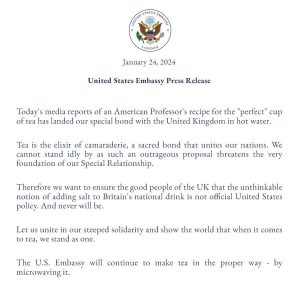An American scientist has stoked embers of diplomatic row by saying that adding a pinch of salt to a cup of tea is the best way to make a perfect cup of the popular beverage.
Yet, the British claim to know a thing or two when it comes to making a good cup of tea, which is a cultural institution in the UK, where an estimated 100 million cups are drunk every day.
A new book by the chemistry professor Michelle Francl says that adding salt to your tea can make it taste less bitter.
salt acts as a blocker to the receptor which makes tea taste bitter, especially when it has been stewed -researcher
Francl, who works at Bryn Mawr College, has published Steeped: The Chemistry of Tea, after researching more than 1,000 years’ worth of brewing.
She read manuscripts that went all the way back to the time of Christ, and even experimented herself at home.
The book contains many tips on how to make the perfect tea and the tips include the following:
- Don’t microwave the water
- If possible, use loose leaves instead of tea bags
- Otherwise, use a tea bag only once
- Dunk that bag up and down
- Add a small squeeze of lemon juice
- Add a pinch of salt
- Stir constantly
However, it’s the one about salt that has Brits up in arms, as those based in the United Kingdom have called Francl’s suggestion “a crime” that has left “Brits at a boiling point.”
Prof Michelle Francl’s research did not only cause quite the stir in the UK, it even drew a diplomatic intervention from the US Embassy.
See the Embassy’s apology to the Brits on behalf of the American people:

“We want to ensure the good people of the UK that the unthinkable notion of adding salt to Britain’s national drink is not official United States policy. And never will be,” the embassy said in a letter of apology.
However, while the US embassy says it will stick to what it calls the “proper way” of making tea – by microwaving it, the UK Cabinet Office is adamant it can only be made using a kettle.
Nothing new
Meanwhile, it is not the first time that tea has caused controversy on both sides of the Atlantic.
Back in 1773, demonstrators in Boston, colonial Massachusetts, threw 300 chests full of tea into the harbour in protest at British taxes – a key moment which sparked the American Revolution.
Reacting, Prof Franc says, “I certainly did not mean to cause a diplomatic incident.
“My emails have been going crazy today. I did not anticipate waking up this morning to see loads of people talking about salt in their tea.”
By adding a pinch of table salt – an undetectable amount – you will counteract the bitterness of tea
So why add salt?
It turns out that it is not a new idea, as the ingredient is even mentioned in eighth century Chinese manuscripts, which Prof Francl analysed to perfect her recipe.
“What is new is our understanding of it as chemists,” Prof Francl said. She explains that salt acts as a blocker to the receptor which makes tea taste bitter, especially when it has been stewed.
By adding a pinch of table salt – an undetectable amount – you will counteract the bitterness of the drink.
“It is not like adding sugar. I think people are afraid they will be able to taste the salt.”
She urges tea-loving Brits to have an open mind before pre-judging her research, which she has documented in her new book Steeped: The Chemistry of Tea, published by the Royal Society of Chemistry.
use loose leaves instead of tea bags and give the drink a constant stir so the tea gets a good exposure to the water and milk
“It is okay to experiment,” she says. “I did experiments in my kitchen for this – channel your inner scientist.”
Everyone has their own opinion on what makes the perfect cup, but Prof Francl recommends using loose leaves instead of tea bags and giving the drink a constant stir so the tea gets a good exposure to the water and milk.
Adding a small squeeze of lemon juice can also remove the “scum” that sometimes appears on the surface of the drink, she adds.
Other suggestions she makes include using short, stout mugs to keep the tea hotter, and warming up the mug and milk, with the latter added in only after pouring the tea.
But chief among her advice is to never, ever heat up the water in a microwave: “It’s less healthy and it does not taste as good,” Prof Francl says.
“You end up getting tea scum forming on the surface, and that scum contains some of the antioxidants and taste compounds.”
To back Prof Francl’s claim, a scholar on China-US Relations who is also a Member of China’s National Cultural Relics Society, Zhai Xiang, says, “I haven’t fully read the professor’s discourse, but the practice of adding salt to tea dates back over a thousand years in the birthplace of tea, China.
“Even emperors during the Tang Dynasty were not exceptions. The custom of adding salt is still retained in the traditions of some ethnic minorities in China today. I am afraid there is no need at all to make a fuss.”


